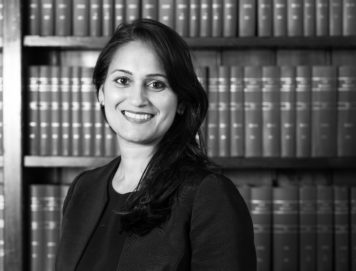Amarjit is a specialist immigration practitioner and a senior member of the Immigration and Public Law team with nearly 20 years’ experience at the Bar.
Throughout her career, Amarjit has been committed to undertaking both legal aid and private work. Her practice covers a broad spectrum of immigration, asylum, human rights and nationality law in the First-Tier Tribunal, Upper Tribunal and the Court of Appeal, including appeals and judicial review challenges.
Amarjit is happy to liaise with solicitors from an early stage in order to get the best possible result.
Amarjit has previously lectured on deportation and long residence applications, and most recently given a webinar on insurmountable obstacles under Appendix FM EX.1.(b) of the immigration rules.
Languages Spoken
Punjabi (conversational), some understanding of Hindi and Urdu
Interested in instructing Ms Seehra?
Please call 020 7353 6802 or complete the form below:
Immigration Barrister
Amarjit’s practice covers a broad spectrum of immigration, asylum, human rights, and nationality work in the First Tier Tribunal, Upper Tribunal and the Court of Appeal, and includes:
- Points Based System
- Appendix FM, family life
- Long residence
- Children
- Human rights claims
- Citizenship / Nationality
- Deportation
- Victims of trafficking
- Asylum
- EEA rights of residence
- Entry clearance applications
Amarjit believes in providing sensible and practical advice, and robust representation in Court – BB, DB v ECO, HU/26018/2016. As an experienced practitioner she has worked with vulnerable and minor clients, displaying a sensitive and approachable manner.
Cases
KV (Sri Lanka) [2018] EWCA Civ 2483, [2018] 4 WLR 166 – Court of Appeal gave guidance on the significance of statelessness and the burden of proof where KV had been deprived of his British Citizenship under section 40(3) British Nationality Act 1981. Led by Hugh Southey QC
TL (Sri Lanka) C5/2016/3238, 2019 – Court of Appeal granted permission to appeal on a point of principle. Following Rhuppiah [2018] UKSC 58 the Court was to reassess the extent of flexibility and approach in Article 8 cases where the Appellant had a precarious immigration status. The Court also considered there were compelling reasons in view of the SSHD’s egregious delay in dealing with the application. Case settled
VT (Sri Lanka) C5/2015/0986, 2018 [DA/01507/2013] – Deportation appeal where VT succeeded before the First-Tier Tribunal and Upper Tribunal based upon his Article 8 family and private life ties in the UK. SSHD obtained permission to appeal to the Court of Appeal and following a long running history withdrew her appeal.
ADK HU/00480/2017 – Upper Tribunal considered the approach to be taken to relationships between adult children and their parents in an entry clearance appeal.
PA (protection claim: respondent’s enquiries; bias) Bangladesh [2018] UKUT 0337
ECO v Attafuah [2002] UKIAT 05922
Public Law Barrister
Amarjit has a strong public law practice focusing on all aspects of immigration, asylum, human rights and nationality law. She has been successful in obtaining numerous grants of permission in judicial review proceedings and consent orders in other applications. In recent times she secured a successful result for a Tier 1 Applicant who had been refused indefinite leave to remain and the Court quashed the Secretary of State for the Home Department’s decision.
Cases
PG [2019] UKAIT JR/4288/2018 – Substantive judicial review hearing where Mr Justice Knowles quashed the SSHD’s decision to refuse to grant a Tier 1 Applicant indefinite leave to remain outside of the rules based upon her exceptional circumstances
JS (India) C2/2018/0869 – JS did not receive notice of his judicial review oral permission hearing and permission to appeal was refused in his absence. He simultaneously appealed to the Court of Appeal and asked the Upper Tribunal to exercise its powers under Procedure Rule 43 (set aside own decision inter alia on the grounds of procedural irregularity). The Upper Tribunal initially declined to exercise that power on the grounds that it no longer had jurisdiction. Following enquiries by the Court of Appeal the Upper Tribunal set aside its decision. In his order the President of the IAC ruled that it did have jurisdiction
RS (Sri Lanka) October 2019: Judicial Review, permission granted by Upper Tribunal in a fresh claim involving a Sri Lankan national where the SSHD arguably failed to analyse the Applicant’s ability to access medical treatment in circumstances where he had previously been ill-treated by the Sri Lankan authorities
NB (Iraq) October 2018: Judicial Review, permission granted by Upper Tribunal in a fresh claim involving a vulnerable Iraqi Applicant without documents
TT, March 2018: Judicial Review, permission granted by Upper Tribunal where a Tier 2 General Migrant was refused leave to remain because his sponsor’s licence was revoked

